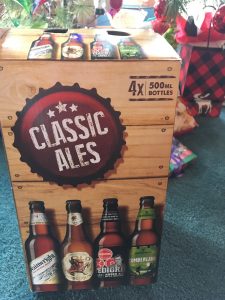Bottle Conditioned Magic #BrewedAwakening
 This year I purchased one of the special packs that arrive annually at the ANBL and other purveyors across Canada. The Classic Ales pack includes 4 x 500 ml bottles of English ale, a couple of which I know well from my trips to the UK: Jennings Cumberland Ale and Marston Pedigree, but only from drinking them as cask conditioned ales at pubs.
This year I purchased one of the special packs that arrive annually at the ANBL and other purveyors across Canada. The Classic Ales pack includes 4 x 500 ml bottles of English ale, a couple of which I know well from my trips to the UK: Jennings Cumberland Ale and Marston Pedigree, but only from drinking them as cask conditioned ales at pubs.
I enjoy these sorts of everyday English ales, 4 to 4.5% alcohol, moderately hopped, with good body and pleasant malt character. The English hops don’t overpower the malt, so you can really appreciate the subtle flavours. One issue with the bottled versions, though, is that they tend to be a bit TOO subtle. Cask conditioning makes the beers more texturally appealing, and UK brewers generally dry hop in the cask to give the beer fresher flavours. It really works well.
The bottled versions are generally a bit ‘flatter’ in taste, more neutral, and thinner in body. Some would argue that part of the problem is pasteurization, but I’ve had several brewers insist to me that today’s pasteurization techniques and equipment do not change the flavour of beer. I’m skeptical.
At any rate, the Marston’s Pedigree in this pack is bottle conditioned, so it’s still alive. Bottle conditioning is akin to the Champagne method for wine. Yeast finishes its fermentation work in the closed bottle, giving carbonation and more complexity of flavour. Yes, there is a little bit of sediment but it’s a minor issue. Tasting the Marston’s next to the other ales reveals a much better taste experience. It has a creamy texture, a very attractive “biscuity” malt aroma, some ale fruitiness, and a light spicy hop note.
In a better world, all these ales would arrive alive.
